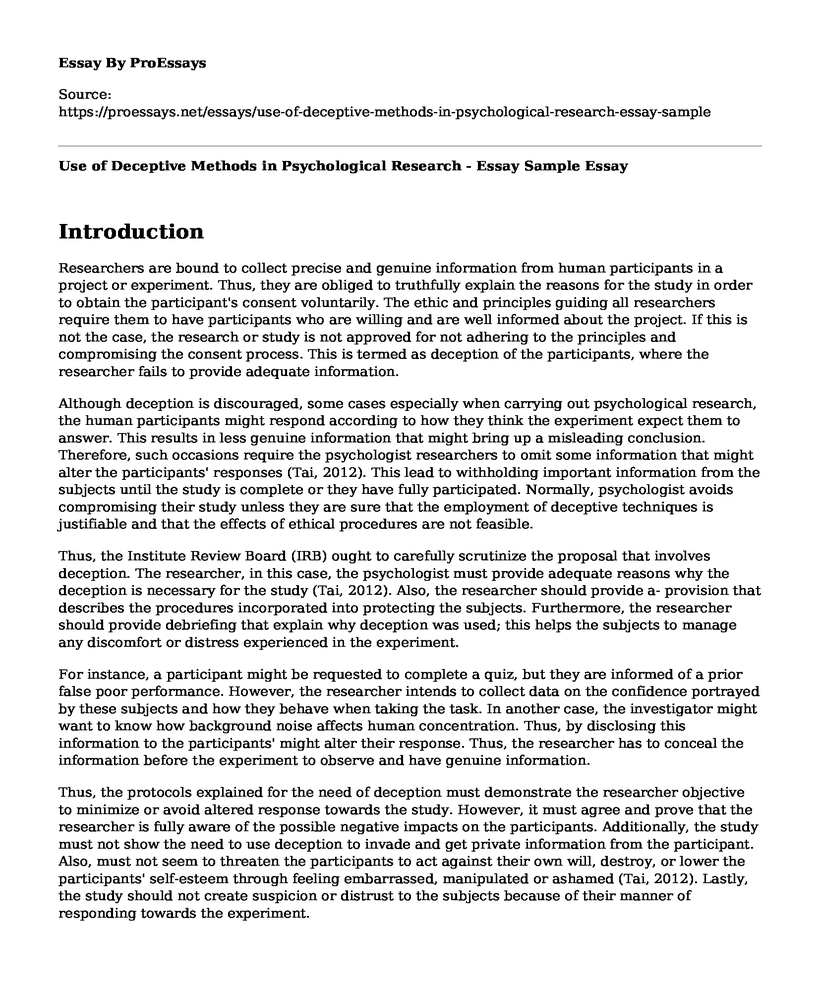Introduction
Researchers are bound to collect precise and genuine information from human participants in a project or experiment. Thus, they are obliged to truthfully explain the reasons for the study in order to obtain the participant's consent voluntarily. The ethic and principles guiding all researchers require them to have participants who are willing and are well informed about the project. If this is not the case, the research or study is not approved for not adhering to the principles and compromising the consent process. This is termed as deception of the participants, where the researcher fails to provide adequate information.
Although deception is discouraged, some cases especially when carrying out psychological research, the human participants might respond according to how they think the experiment expect them to answer. This results in less genuine information that might bring up a misleading conclusion. Therefore, such occasions require the psychologist researchers to omit some information that might alter the participants' responses (Tai, 2012). This lead to withholding important information from the subjects until the study is complete or they have fully participated. Normally, psychologist avoids compromising their study unless they are sure that the employment of deceptive techniques is justifiable and that the effects of ethical procedures are not feasible.
Thus, the Institute Review Board (IRB) ought to carefully scrutinize the proposal that involves deception. The researcher, in this case, the psychologist must provide adequate reasons why the deception is necessary for the study (Tai, 2012). Also, the researcher should provide a- provision that describes the procedures incorporated into protecting the subjects. Furthermore, the researcher should provide debriefing that explain why deception was used; this helps the subjects to manage any discomfort or distress experienced in the experiment.
For instance, a participant might be requested to complete a quiz, but they are informed of a prior false poor performance. However, the researcher intends to collect data on the confidence portrayed by these subjects and how they behave when taking the task. In another case, the investigator might want to know how background noise affects human concentration. Thus, by disclosing this information to the participants' might alter their response. Thus, the researcher has to conceal the information before the experiment to observe and have genuine information.
Thus, the protocols explained for the need of deception must demonstrate the researcher objective to minimize or avoid altered response towards the study. However, it must agree and prove that the researcher is fully aware of the possible negative impacts on the participants. Additionally, the study must not show the need to use deception to invade and get private information from the participant. Also, must not seem to threaten the participants to act against their own will, destroy, or lower the participants' self-esteem through feeling embarrassed, manipulated or ashamed (Tai, 2012). Lastly, the study should not create suspicion or distrust to the subjects because of their manner of responding towards the experiment.
This ensures that the protocol explained by the researcher coincide with set principles that justify the methods and procedures to be observed when using deception. Also, it ensures that the investigator uses justifiable deception techniques that agree to the prospective scientific, educational and applied value benefits. Furthermore, the deception method must only be used when and only the non-deceptive methods are not viable or feasible.
Conclusion
In conclusion, the use of deceptive methods in psychological research is sometimes necessary especially when non-deceptive methods are not viable. However, these methods should be carefully reviewed to ensure that the risks involved in the participants are not harmful. Also, the researchers should not use the methods to deceive their subjects or invade their privacy.
References
Tai, M. C. (2012). Deception and informed consent in social, behavioral, and educational research (SBER). Tzu Chi Medical Journal, 24(4), 218-222. doi:10.1016/j.tcmj.2012.05.003
Cite this page
Use of Deceptive Methods in Psychological Research - Essay Sample. (2022, Nov 20). Retrieved from https://proessays.net/essays/use-of-deceptive-methods-in-psychological-research-essay-sample
If you are the original author of this essay and no longer wish to have it published on the ProEssays website, please click below to request its removal:
- Analysis of Fictional Show "13 Reasons Why"
- Meditations in Philosophy of Descartes Essay Example
- Argumentative Essay on Curiosity in Science
- Employee Stress: Breaking the Cycle of Negativity and Low Productivity - Research Paper
- Personality Disorders: Anger, Unhappiness, Isolation - Essay Sample
- Essay Sample on Vyvanse: Treatment of ADHD in Children Aged 5 and Over
- Essay Example on Norman's Human Environment: A Cognitive Psychologist's Discovery







